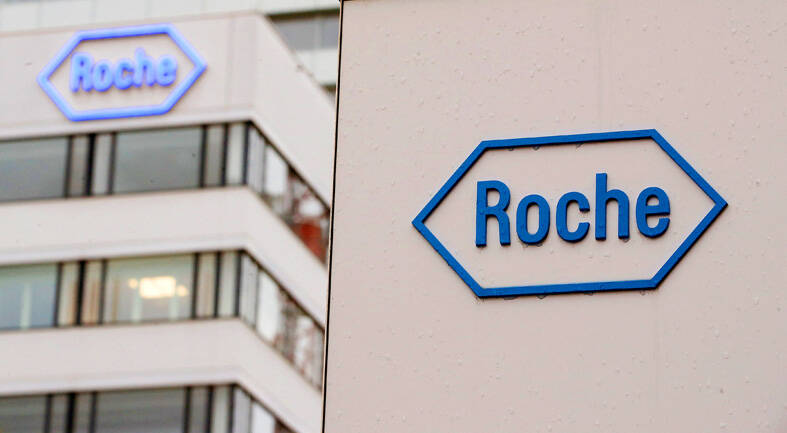Roche Holding AG has agreed to buy Carmot Therapeutics Inc, the developer of a new kind of weight-loss treatment that is the hottest commodity in the pharmaceutical industry, in a deal that could eventually push the Swiss drugmaker into competition with European rival Novo Nordisk A/S.
Roche agreed to pay as much as US$3.1 billion for three clinical-stage assets in obesity and diabetes, with an initial payment of US$2.7 billion and additional milestones of up to US$400 million, the company said in a statement on Monday.
Although Carmot’s drugs are still in the early stages of development, the deal could lead to a competitor to the likes of Novo Nordisk’s Wegovy and Eli Lilly & Co’s Zepbound, which are fueling the growth of a weight-loss market estimated to reach US$100 billion by the end of the decade.

Photo: Reuters
Roche is joining a race by global pharmaceutical giants to get into that business, with Pfizer Inc also developing a new weight-loss drug and AstraZeneca PLC signing a licensing deal with Chinese drug developer Eccogene Inc (誠益生物) for a pill to treat obesity.
Among Carmot’s financial backers is Horizons Ventures Ltd (維港投資), the private investment arm of tycoon Li Ka-shing (李嘉誠), Hong Kong’s richest person, the Bloomberg Billionaires Index shows.
Carmot’s lead asset is a treatment for obesity in patients with and without Type-2 diabetes. Injected subcutaneously once per week, it has potential as a standalone and combination therapy to improve weight loss and be expanded to other indications, Roche said.
Upon closing the deal, Roche would obtain all of Berkeley, California-based Carmot’s clinical and preclinical assets. The transaction is expected to close in the first quarter of next year.

TECH BOOST: New TSMC wafer fabs in Arizona are to dramatically improve US advanced chip production, a report by market research firm TrendForce said With Taiwan Semiconductor Manufacturing Co (TSMC, 台積電) pouring large funds into Arizona, the US is expected to see an improvement in its status to become the second-largest maker of advanced semiconductors in 2027, Taipei-based market researcher TrendForce Corp (集邦科技) said in a report last week. TrendForce estimates the US would account for a 21 percent share in the global advanced integrated circuit (IC) production market by 2027, sharply up from the current 9 percent, as TSMC is investing US$65 billion to build three wafer fabs in Arizona, the report said. TrendForce defined the advanced chipmaking processes as the 7-nanometer process or more

China’s Huawei Technologies Co (華為) plans to start mass-producing its most advanced artificial intelligence (AI) chip in the first quarter of next year, even as it struggles to make enough chips due to US restrictions, two people familiar with the matter said. The telecoms conglomerate has sent samples of the Ascend 910C — its newest chip, meant to rival those made by US chipmaker Nvidia Corp — to some technology firms and started taking orders, the sources told Reuters. The 910C is being made by top Chinese contract chipmaker Semiconductor Manufacturing International Corp (SMIC, 中芯) on its N+2 process, but a lack

Who would not want a social media audience that grows without new content? During the three years she paused production of her short do-it-yourself (DIY) farmer’s lifestyle videos, Chinese vlogger Li Ziqi (李子柒), 34, has seen her YouTube subscribers increase to 20.2 million from about 14 million. While YouTube is banned in China, her fan base there — although not the size of YouTube’s MrBeast, who has 330 million subscribers — is close to 100 million across the country’s social media platforms Douyin (抖音), Sina Weibo (新浪微博) and Xiaohongshu (小紅書). When Li finally released new videos last week — ending what has

OPEN SCIENCE: International collaboration on math and science will persevere even if the incoming Trump administration imposes strict controls, Nvidia’s CEO said Nvidia Corp CEO Jensen Huang (黃仁勳) said on Saturday that global cooperation in technology would continue even if the incoming US administration imposes stricter export controls on advanced computing products. US president-elect Donald Trump, in his first term in office, imposed restrictions on the sale of US technology to China citing national security — a policy continued under US President Joe Biden. The curbs forced Nvidia, the world’s leading maker of chips used for artificial intelligence (AI) applications, to change its product lineup in China. The US chipmaking giant last week reported record-high quarterly revenue on the back of strong AI chip